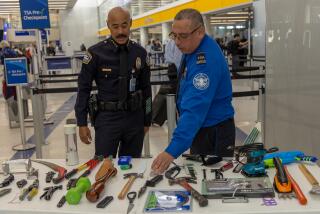House committee scolds Coast Guard for lax inspection of Deepwater Horizon
Members of the House transportation committee castigated the Coast Guard on Thursday for being insufficiently aggressive in tracking and inspecting foreign oil drill vessels such as the Deepwater Horizon, which exploded April 20 in the Gulf of Mexico, killing 11 crewmen and causing the worst spill in U.S. history.
Under harsh questioning, Coast Guard Rear Adm. Kevin Cook said the Deepwater Horizon, registered to the tiny Republic of the Marshall Islands, operated under a different command structure than would have been permitted for a similar vessel operating under the U.S. flag.
The Marshall Islands authorized a drilling manager to be in charge of the Deepwater Horizon while the rig was seeking oil at sea. U.S. law would have placed a specially trained sea captain in command, Cook said.
Critics have suggested this management structure contributed to confusion aboard the vessel on the day of the explosion, and an inappropriate emphasis on oil production over safety.
“This is our watch, and I know for a fact we can do better,” said Rep. Elijah E. Cummings (D-Md.), chair of the subcommittee on Coast Guard and Maritime Transportation, who led the questioning during the hours-long inquiry.
At the hearing, members of both parties urged the Coast Guard to ramp up its safety oversight and to consider permitting only American-flagged vessels in U.S. protected waters in the future.
Cook, who oversees inspection for the Coast Guard, said foreign-flagged vessels operating in U.S. waters meet or exceed international safety guidelines. The Deepwater Horizon was flying the flag of the Marshall Islands, a remote archipelago in the Pacific, whose fleet is managed by a Reston, Va., company staffed largely by veterans of the U.S. Coast Guard.
Under questioning, Cook said that Coast Guard inspections of U.S.-flagged rigs are more intensive and rigorous than those applied to foreign vessels, like the Deepwater Horizon. In those cases, Cook said, the Coast Guard relies in part on outside companies that submit detailed inspection reports that are then reviewed by the Coast Guard.
Cook said the Coast Guard had “some reason to have confidence” in the inspection reports provided by the Marshall Islands, and its contractors, who work under international standards. “To the extent that we can verify the compliance, it was as good a job” as the Coast Guard would have done, Cook said.
The chairman of the Transportation and Infrastructure Committee, Rep. James L. Oberstar (D-Minn.), expressed skepticism about the international regulatory system.
“Who verifies that the organizations in the Marshall Islands, the ones that they recognize to do the work, are doing it properly?” Oberstar asked.
Cook said the Coast Guard is working to update its safety and inspection rules with a goal to “make sure it’s a seamless marriage” between vessel safety and drilling operations on rigs like the Deepwater Horizon.
Warren Weaver, manager of regulatory compliance at Transocean, the Swiss-based owner of the Deepwater Horizon, defended the company’s use of foreign flags. “It has nothing to do with relaxed manning or safety standards,” he said, adding that being flagged in the Marshall Islands “does not reduce or diminish inspections.”
More to Read
Start your day right
Sign up for Essential California for news, features and recommendations from the L.A. Times and beyond in your inbox six days a week.
You may occasionally receive promotional content from the Los Angeles Times.






